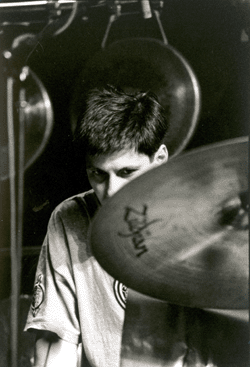Le Quan Ninh
 A musical tightrope walker, percussionist Le Quan Ninh likes to soar without ever leaving the ground.
A musical tightrope walker, percussionist Le Quan Ninh likes to soar without ever leaving the ground. His solo concerts are completely improvised with no planned conclusion and utilize such unlikely instruments as stones, an aluminium sheet and a handful of chickpeas, as well as cymbals, gongs and a bass drum turned on its side.
Performing without sticks, he avoids using any formal technique in his playing, even though he is an award-winning percussionist with extensive classical training and tenure in several acclaimed ensembles. Moreover, this maverick doesn`t consider himself to be a percussionist or a musician, at least in any conventional sense.
"Maybe I`m only really involved in sound and silence," said Le (his first name is Ninh).
"I never think about form when I improvise," he continued, speaking from a recent Chicago concert stop. "So the only thing I must choose is the very first sound I use. I like to feel the room I`m performing in and its acoustics, and that will indicate what kind of picture I can begin with.
"After that, I don`t think about what will follow, and so I try to feel and free the needs of sound vibrations and to be absolutely inside these vibrations. Sometimes that indicates a new aural state, and I try to slide from one state to another. The period of sliding is the most important thing; it`s exactly where the free-improvisation is."
Freedom is of the utmost importance to Le, 38, who regards his French-Vietnamese heritage as a political metaphor.
So is spontaneity and the ability (and willingness) to let his music take him to uncharted new destinations as often as possible.
"I try to follow my intuition all the time," Le said. "I play everything with my hands, so I can put things on the head of the bass drum and make contact with them, which creates a rich palette of harmonics, as well as complicated and quite random rhythms. Because my interest is to be very precise in the imprecision."
Born in Paris in 1961, Le began formally studying piano at age 5. He left piano behind while in his teens, after a friend and fellow pianist enrolled in a percussion class. But that wasn`t his sole motivation.
"In this percussion class, there was a very beautiful girl," Le recalled with a laugh. "Unfortunately, she moved two months later. But I kept going to the lessons."
Since launching his career in the early 1980s, Le has appeared on more than two-dozen albums. He has earned a lofty reputation as a solo artist and for his collaborations with such envelope-pushing musicians as Butch Morris, Elliott Sharp and Robert Dick.
He is also one of the foremost performers of works by such visionary composers as John Cage and George Lewis, under whose auspices Le`s Helios Quartet performed. Le`s cutting-edge career is partially financed by monthly stipends from the French government, and he devotes time each year in France to teaching free-improvisation to other musicians and public-school students.
"The children I teach are the most open-minded, including teen-agers, even though we think they are overwhelmed by television culture," Le noted.
"But in France the worst people to teach are the jazz musicians, because they think they know what an improvisation is, or what it should be, and it`s always a disaster. The goal is to reach freedom. And the more you work with other people and trust them, the more free you feel."
(c) Copley News Service
advertisement

Author: George Varga
Archives
The Verve Pipe
Judy Collins
Jewel
Ben E. King
NSYNC
311
Nickel Creek
Brian Wilson
Spinal Tap
Mark Knopfler
SR-71
Stevie Nicks
Iggy Pop
Henry Threadgill
Joe Jackson
More Articles






